‘Framing' the homeless
By dispelling stereotypes, David Snow helps communities solve a human crisis
The homeless are the homeless — a social enigma — or so it seemed until UCI sociology professor David Snow came along.
Although a specialist in social movements and social protests, Snow has, over the course of his career, become an authority on the lives of homeless people. He first entered this unusual field of study at the request of local government officials while teaching at the University of Texas at Austin in the early 1980s. “Different agencies had loads of questions about the homeless, but they had no comprehensive, systematically collected data to develop decent public policy,” Snow says.
To counter this data deficiency, Snow and a colleague, Leon Anderson, followed and interviewed homeless people in Austin for two years — spending more than 500 hours on the streets. The work led to their influential book, Down on Their Luck: A Study of Homeless Street People.
That early work, along with Snow’s later studies conducted at the University of Arizona and his ongoing studies in the School of Social Sciences at UCI, are providing an expert examination of homelessness and, in the process, a road map for successful policies to deal with the problem.
“There are different categories of homelessness,” says Snow, who came to UCI in 2001. “Some homeless people have mental problems, some have drinking problems, some just ran out of luck, and some are dealing with a combination of issues. You can’t have a one-size-fits-all policy. You have to have a number of programs focused on different aspects of the problem.
“While helpful, ‘shelterization’ is not an effective policy to deal with the issue,” he adds. ”What you want is transitional housing in connection with job training and jobs that pay a living wage.”
In the process of providing important, reliable information about homelessness, Snow has dispelled many stereotypes about homeless people, including:
• They are lazy and refuse to work. The homeless people Snow surveyed consistently listed finding a job that pays a living wage among their top priorities. Many said they collected cans and junk for resale, or panhandled, on a daily basis, and even more said they were taking day labor jobs to provide for themselves.
• Most are alcoholics. His studies show that 25 to 35 percent of the homeless indicate problems with alcohol. Snow suggests that drinking is part of the homeless subculture, much as it is part of the college subculture. His research also finds that drinking increases the longer a homeless person is on the street. However, drinking alone does not explain why many people become homeless.
• Most are involved in petty criminal activities. Snow has documented that the rate of violent crimes perpetrated among the homeless is lower than among people living in homes. The homeless did have a higher rate of misdemeanors, such as public intoxication, urinating in public and sleeping in parks – activities that if committed in a home would not be crimes.
THEORY & PRACTICE
“David Snow has made several noted contributions to the field of sociology,” says Judith Stepan-Norris, professor of sociology. “He has played important roles in increasing the understanding of social movements and has contributed to the concept of ‘framing,’ which has gained wide popularity in sociology and other fields.”
As developed by Snow and others, framing provides a theoretical and empirical way to better study social movements and collective behavior. It allows researchers to understand how movement leaders and their followers define events and social conditions in a way that facilitates collective mobilization. Martin Luther King Jr., for example, was a brilliant frame communicator, says Snow, by pulling together and articulating strands of Christianity and democracy that resonated with so many people and got them involved in his cause.
A LASTING IMPACT
Snow is proud of both his theoretical contributions to his field and his research on homelessness, and he feels compelled to use his work to help improve lives whenever he can. In Tucson, where he conducted homeless studies for the University of Arizona, Snow joined the board of the Primavera Foundation, an organization that supplies men’s and women’s shelters, helps homeless people seek jobs and offers other assistance to get people off the streets.
“Any of us in academia can research and write for each other, and talk to each other — which is what we do much of the time,” he says. “But we have an obligation to extend our work beyond the academy. If I’m studying a broad social problem, I feel compelled to connect my work to the city, county, state or country in which I live.”

